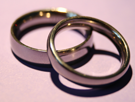
 News broke last night that the Minnesota House of Representatives voted 70-63 to approve a measure passed down by the MN Senate, which voted 38-29, to put marriage equality on the ballot in 2012 in the form of a constitutional amendment that would define marriage as between “one man and one woman.’ According to CBS, “[c]onstitutional amendments need approval from a majority of state lawmakers and a simple majority of those voting in a general election.” This from the AP:
News broke last night that the Minnesota House of Representatives voted 70-63 to approve a measure passed down by the MN Senate, which voted 38-29, to put marriage equality on the ballot in 2012 in the form of a constitutional amendment that would define marriage as between “one man and one woman.’ According to CBS, “[c]onstitutional amendments need approval from a majority of state lawmakers and a simple majority of those voting in a general election.” This from the AP:
The [House] vote split mostly along party lines, with Republicans in support and Democrats opposed. Four Republicans crossed over to vote `no,’ and two Democrats voted `yes.’
Three things from the House vote, and forthcoming state vote, immediately grab my attention.
First, more GOP members crossed over in favor of marriage equality than Democrats crossed over against it. This was not the case in my home state of Iowa, where three Democrats joined all GOP members of the Iowa House. (There was no vote in the IA Senate.) I’m going to have to do some digging, but this could very well be the first time we’ve ever witnessed this voting pattern. I’ll update later to confirm if this is or isn’t the case.
Second, the actual vote is nearly a year and a half away. That’s a long time. In the last year and a half, national support for marriage equality has flipped, from about 51% opposing and 42% supporting to 51% supporting and 46% opposing. Two great articles on these numbers from statistician genius Nate Silver here and here. As Mr. Silver points out, the opinion on marriage equality is shifting at an accelerating pace. In the last six months, we’ve seen the President of the United States declare the Defense of Marriage Act unconstitutional, the demise of Don’t Ask, Don’t Tell and the beginnings of a concerted push for marriage equality in New York, where the worth of a legislative victory (both nationally and internationally) would be hard to hard to underestimate. Two observations.
- The case for marriage equality does not well lend itself to a soundbite. A year and a half gives proponents of LGBTQ civil rights the chance to build the dialogue over the course of many months, establishing, piece by piece, the case for equality.
- Already, a majority of Minnesotans are opposed to the bill. A May 13 poll found 55% of Minnesohtans opposed to a ban on gay marriage with only 39% supporting. This leaves 6% of Minnesotans without an opinion, but puts opposition to the ban well beyond the poll’s margin of error of 4.7 percentage points. This is, again, a reversal from 2006, when the numbers were flipped, when 54% of Minnesotans were opposed to gay marriage and only 29% of Minnesotans signaled their support. According to the same article, opposition was at 63% in 2004. You don’t need to be a statistician to see the trend, here. (It’s also worth noting that these questions weren’t asking the *exact* same thing, as one is gauging opposition to gay marriage and one is gauging opposition to a measure banning gay marriage, but they’re similar.)
As a side note, back in 2006, Arizona faced a similar situation. Like Minnesota, marriage was already defined as between one man and one woman by state statute. And even though Arizona is largely recognized as being a more conservative state than Minnesota, voters shot down the proposed amendment by a 4% margin.
Finally, when MN votes, President Obama’s name will be at the top of the ballot. In 2008, Minnesota voted for Mr. Obama 55% to 44% with the highest voter turnout in the country at 78.2%, almost twenty points higher than the national average. The GOP had a good showing in the 2010 election, capturing a Democratic US Representative seat, but still lost the governorship to Democrat Mark Dayton in a close vote, even as participation slumped to 56%. With Mr. Obama’s now legendary campaign juggernaut gearing up for 2012–and MN unemployment continuing to drop even as gas prices rise–it seems likely that voter turnout will again be in top form, giving an edge to supporters of marriage equality.
Given these three defining elements, Minnesota seems on track–barring any unforeseen developments–to vote down the proposed constitutional amendment.
I can’t wait to see the look on Michele Bachmann’s face.
Zach Wahls is a columnist for the Daily Iowan. He is a contributor to the Student Free Press Association.
Photo credit: comedy_rose (Flickr Creative Commons)
Like The College Fix on Facebook / Follow us on Twitter





Please join the conversation about our stories on Facebook, Twitter, Instagram, Reddit, MeWe, Rumble, Gab, Minds and Gettr.